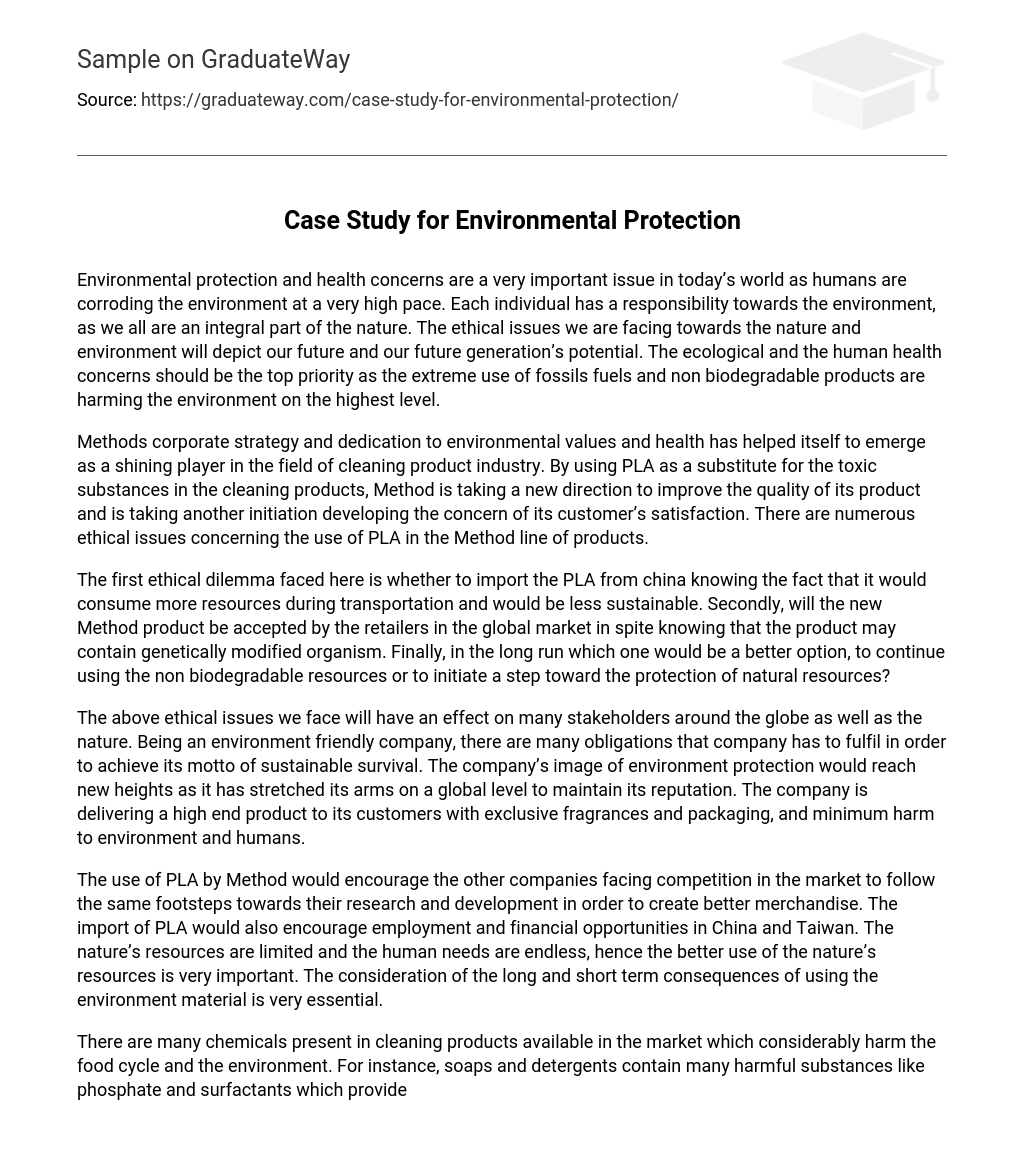Considering the negative impacts of human activities on the environment, it is crucial for people to prioritize both environmental protection and health concerns in today’s society. Recognizing our connection with nature and taking responsibility for our actions towards the environment are essential. Our combined efforts will influence not only our own future but also that of future generations. Hence, preserving ecological balance and promoting human well-being should be our primary goal, given the harmful consequences of excessive dependence on fossil fuels and non-biodegradable items.
Method differentiates itself in the cleaning product sector by prioritizing environmental values and health, as reflected in its corporate strategy. The company’s dedication to enhancing product quality and guaranteeing customer satisfaction entails replacing harmful substances with PLA in their cleaning products. Nevertheless, incorporating PLA across Method’s entire product line raises various ethical issues.
The ethical dilemmas in this situation involve deciding whether to import PLA from China, even though it will use more resources during transportation and be less sustainable. It also raises the issue of whether global market retailers will accept the new Method product if they are aware that it might have genetically modified organisms (GMOs). Essentially, there is a choice between persisting with non-biodegradable resources or making a move towards safeguarding natural resources in the long run.
The mentioned ethical concerns will impact various stakeholders and the environment. As a company that values environmental consciousness, there are several responsibilities to fulfill for sustainable survival. Expanding its global presence will enhance the company’s reputation for safeguarding the environment. The company is committed to offering customers top-notch products with unique fragrances and packaging while minimizing harm to both the environment and humans.
Utilizing PLA from Method would encourage other companies to invest in research and development, enhancing competitiveness. Importing PLA would also lead to employment opportunities and economic growth in China and Taiwan. With limited natural resources, maximizing resource efficiency is crucial for meeting infinite human needs. Therefore, it is essential to consider the long-term and short-term effects of using eco-friendly materials.
There are many cleaning products available for purchase that can have severe negative effects on the food cycle and the environment. For instance, soaps and detergents contain harmful components like phosphate and surfactants. These substances act as nutrients for plants, causing algae to grow excessively and reduce oxygen levels in our surroundings. Moreover, numerous non-biodegradable materials take thousands of years to break down, leading to overflowing landfills and rendering soil infertile for agriculture. While opting for cheaper materials or sources may provide immediate financial advantages, it ultimately proves extremely destructive over time.
The utilization of PLA serves as a symbolic representation of the Method’s commitment to raising awareness about environmental preservation. Moreover, it aids in fostering customer relationships by demonstrating the company’s transparency and avoidance of any unethical actions that could potentially spark controversy in the future. Method strives to offer top-notch products without any hidden agendas to its stakeholders, guaranteeing that all details pertaining to the product will not elicit negative responses from consumers and critics. As an alternative to numerous toxic chemicals detrimental to both the environment and human health, PLA functions as a highly efficient and economical substitute.
The company is facing an ethical quandary concerning the sourcing of its materials. It must determine if it should persist in utilizing hazardous substances such as phosphate and polyethylene terephthalate or instead import PLA from China. The company has a dedication to offering a natural and minimally detrimental product, and it believes that outsourcing PLA from China provides the most favorable combination of cost-effectiveness and long-term sustainability. Should the company opt for importing PLA, it will be crucial to disclose to consumers the inclusion of genetically modified organisms in the product, as consumers have a rightful entitlement to precise information.
The use of PLA material in the product is aimed at meeting customer satisfaction by specifying the substance and content. The company’s reputation has gained considerable acceptance from various retailers and buyers in a short period of time. When considering the pros and cons of the product, it becomes evident that using PLA is much more favorable than using harmful and toxic chemicals, which goes against the company’s principles. However, the use of PLA in cleaning products may create ethical dilemmas for individuals and communities, as opinions on its use differ among them. To address this, the company should adopt a full disclosure policy regarding the product and take pride in its commitment to a healthier future. Method’s responsibility to consumers is to offer a high-quality product with minimal negative impact on nature and humans. While there may be various responses to this issue, it seems appropriate, based on the company’s principles and consumers’ best interests, to conclude that substituting toxic substances with PLA in cleaning products would be the optimal solution.
The use of PLA in cleaning products raises ethical concerns. To address these concerns adequately, it is recommended to gather sufficient information and be prepared for potential consequences when making a decision. The best approach is to select a course of action that benefits both the customer and the company as a whole. While certain individuals may object to importing PLA from China for cleaning products based on their beliefs, a thorough evaluation of available information suggests that it is a reasonable choice in this specific ethical dilemma.





